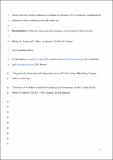Social experience during adolescence in female rats increases 50 kHz ultrasonic vocalizations in adulthood, without affecting anxiety-like behavior
Abstract
Adolescents are highly motivated to engage in social interactions, and researchers have hypothesized that positive social relationships during adolescence can have long term, beneficial effects on stress reactivity and mental well‐being. Studies of laboratory rodents provide the opportunity to investigate the relationship between early social experiences and later behavioral and physiological responses to stressors. In this study, female Lister‐hooded rats (N = 12 per group) were either (a) provided with short, daily encounters (10 min/day) with a novel partner during mid‐adolescence (postnatal day 34–45; “social experience,” SE, subjects) or (b) underwent the same protocol with a familiar cagemate during mid‐adolescence (“control experience,” CE, subjects), or (c) were left undisturbed in the home cage (non‐handled “control,” C, subjects). When tested in adulthood, the groups did not differ in behavioral responses to novel environments (elevated plus maze, open field, and light‐dark box) or in behavioral and physiological (urinary corticosterone) responses to novel social partners. However, SE females emitted significantly more 50 kHz ultrasonic vocalizations than control subjects both before and after social separation from a familiar social partner, which is consistent with previous findings in male rats. Thus, enhanced adolescent social experience appears to have long‐term effects on vocal communication and could potentially modulate adult social relationships.
Citation
Emmerson , M G , Spencer , K A & Brown , G R 2019 , ' Social experience during adolescence in female rats increases 50 kHz ultrasonic vocalizations in adulthood, without affecting anxiety-like behavior ' , Developmental Psychobiology , vol. Early View . https://doi.org/10.1002/dev.21906
Publication
Developmental Psychobiology
Status
Peer reviewed
ISSN
0012-1630Type
Journal article
Description
Funding was provided by a University of St Andrews postgraduate studentship to MGE.Collections
Items in the St Andrews Research Repository are protected by copyright, with all rights reserved, unless otherwise indicated.

